Twelve months ago, the Sheffield Labour Party was in disarray. On the morning of the local election count a bombshell landed: Terry Fox was being removed as leader. Our piece that was published later the same day explained for the first time what had happened, with one well-placed insider telling me Labour’s national hierarchy had presented him with an offer he couldn’t refuse. “They put a gun on the table and said, are you going to pull the trigger or us,” they said.
Fast forward a year and the 2024 local elections are now just five days away. Terry Fox was ousted last year due to Labour’s continued underperformance in Sheffield. Given the results in nearby cities like Manchester, Leeds and Liverpool, where Labour dominate, the party should have been winning Sheffield easily. However, according to the Labour party hierarchy, they had failed to win back control due to the bungled response to Sir Mark Lowcock’s report into the street tree dispute, the well-publicised Fargate container fiasco, and the mishandling of the Clean Air Zone rollout. While it wouldn’t be true to say the national party had hand picked new leader Tom Hunt, they clearly wanted new faces and a fresh start. His mission: to win back Sheffield for Labour.
Over the last week The Tribune has been speaking to insiders from all the four main party groupings in Sheffield: Labour, the Lib Dems, the Greens and the new Sheffield Community Councillors group (the Conservatives only hold one seat, which they look likely to lose — as such, we didn’t think it was worth covering their electoral chances here). We’ve attempted to establish the best case and worst case scenarios for all. In none of these scenarios does Labour win back control of a council they lost in 2021. At this point you may be asking yourself: does this mean that Labour’s plan to swap Terry Fox for a new leader has backfired? Well, not quite.
Labour will certainly pick up seats this time, possibly as many as seven. But even in their best case scenario they would only be on 38 councillors, still five short of having an overall majority. The reason for this goes back to Terry Fox’s departure last May. A few months later, eight former Labour councillors loyal to him left the party after voting against the party whip on the Local Plan. These councillors, who now sit as the Sheffield Community Councillors group on the council, will continue to hold at least six seats after Thursday’s poll. Their continued presence effectively means Labour can’t win.
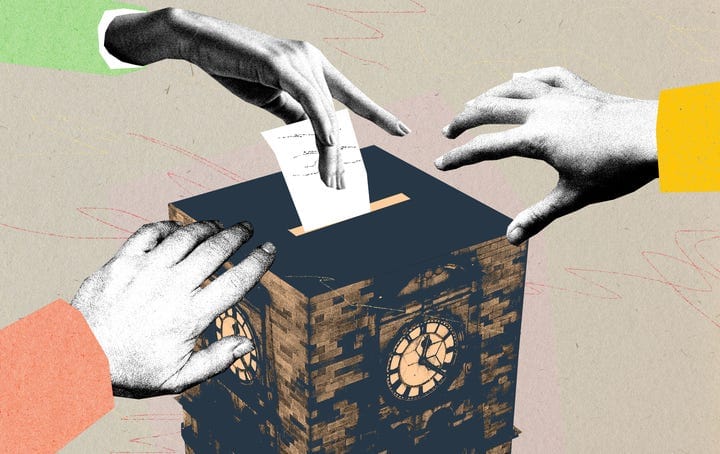
Given this, you might expect Labour to be gloomy about missing an opportunity to win back the council after a painful few years. Surprisingly, that doesn’t seem to be the dominant mood. Last year, as we reported at the time, the party was in “absolute turmoil”. Realising the local campaign was underperforming given the national polls, the national party had stepped in three weeks before polling date. “They were thinking if these voters lived in Manchester or Leeds, they’d vote Labour,” one insider told us. “Why are they not voting Labour in Sheffield local elections?” However, when the national party began running the campaign and re-allocating resources to new seats, the imposition of central control went down badly among some in the party, particularly those loyal to Terry Fox from the city’s south east.
Things have changed this time around. We’ve been told the party is united in a way it wasn’t a year ago, and is looking forward to making the first serious gains in Sheffield since 2012. “I’d say the mood is optimistic,” one senior Labour member told us. “It feels like there is a clear central direction. And even if it's not, ‘we can win this year’, there is a lot of hope we may have a Labour government, we may have a Labour mayor, and there will be a lot more delivery.” Another insider agreed. “I think the mood is pretty good,” they told us. “We've got a new leadership, they've got a plan and everybody is getting behind it.”
If you followed the Terry Fox drama, you might wonder what his ejection has meant for Labour. Does a Tom Hunt-led Sheffield Labour feel radically different? Well, yes and no. Even before they left, the group loyal to Fox were referred to by some in the party as the “south east mafia”. These councillors, while not exactly left-wing firebrands, were strongly rooted in the labour movement, some as a result of their previous careers in the city’s traditional heavy industries. Unpolished and bluff, they looked increasingly out of place in the Labour Party of Keir Starmer (“Starmer’s team just didn’t rate him,” is how one well-connected source once put it to us last year). By contrast the Sheffield Labour Party led by Tom Hunt now feels culturally very different. Described by colleagues as a technocrat, Hunt is a university academic who comes from the professional classes from which Labour increasingly draws its support. The party hopes to project a modern, white-collar, centrist image, in much the same way as Tony Blair and New Labour did in the 1990s. How you feel about that probably depends on your own politics: some might find this image bland and uninspiring, while others might conclude it suggests Sheffield Labour is focused and determined to win.
Like so many local council election manifestos, Labour's policies are a bit motherhood and apple pie — help with the cost of living, taking pride in our local area, backing the next generation to succeed. In addition to these slightly nebulous goals, they're rooting for better public transport and safer journeys, as well as a stronger local economy and new homes. However, the main reason that Labour really wanted to win this time is because of power. With a general election imminent, the party wanted a Labour controlled council to go with its Labour mayor and then a Labour government. The idea being that if you get that, and hold all the levers of power at the different levels of government, you are more likely to be able to get stuff done.
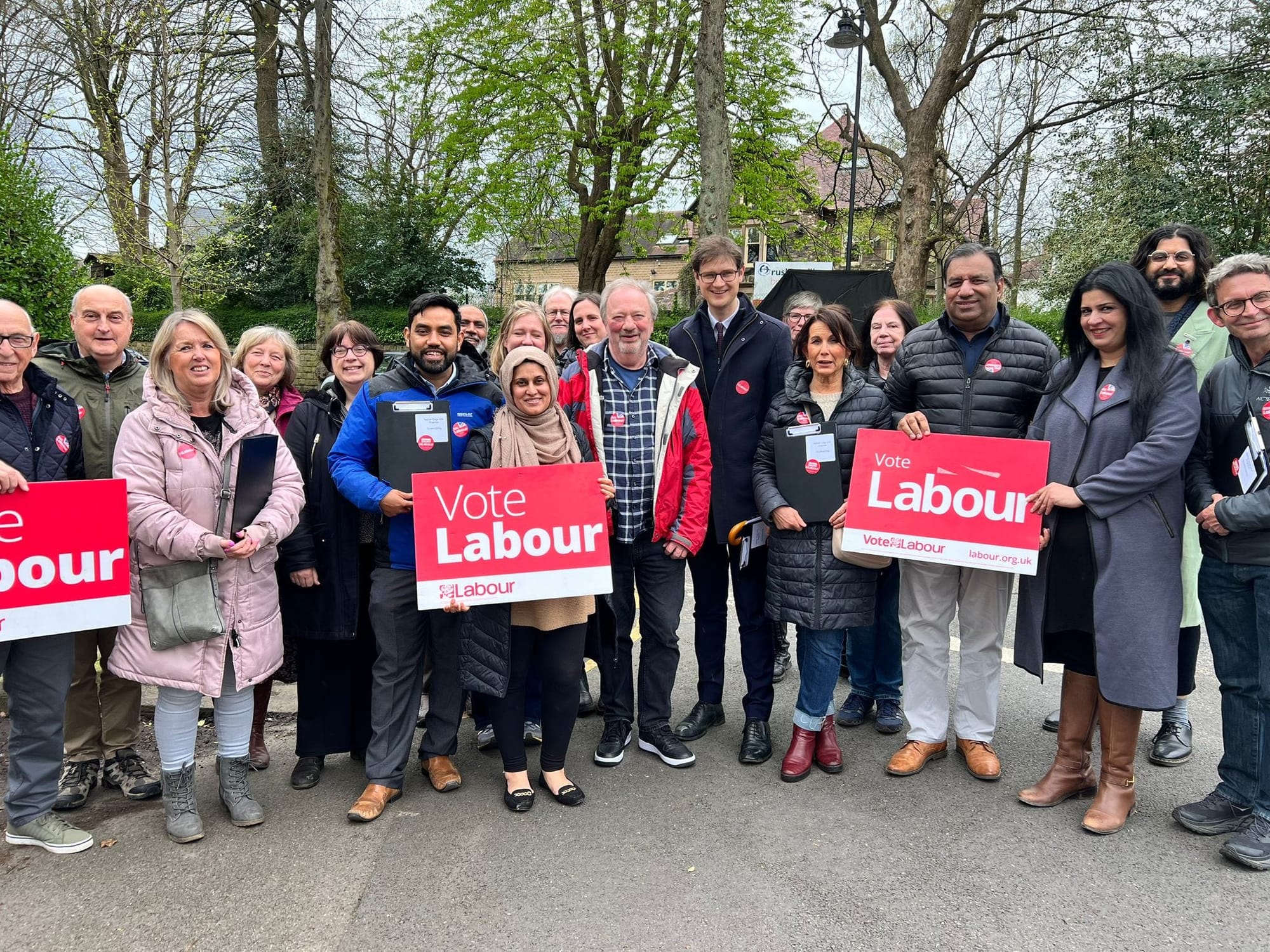
Obviously, the other parties would disagree and see themselves as an important counterweight to Labour being able to do what they want. While the Sheffield Community Councillors don’t have a formal manifesto, leader Dianne Hurst spoke a lot about both the need for new council housing and for the council to repair and improve the council housing stock they already have when I spoke to her earlier this week. In the Lib Dems’ manifesto (‘Getting Sheffield Back On Track’), they argue they would be better stewards of Sheffield and that the city has been hurt by a series of controversies including the tree scandal, the Fargate container fiasco, a “botched” Local Plan consultation, and continuing neglect of the city’s heritage. While their manifesto details a long list of plans, none of the details really distinguish them much from Labour. This is ironic, given that their argument is essentially that they’ll run things better than Labour do (and tricky to back up, given that the Lib Dems have also been in power over the last year).
In their manifesto the Greens try to differentiate themselves by promising “real action on the climate and nature emergencies” including a commitment to install solar panels on all new buildings and car parks. But given that neither party is seriously hoping to take control of the council, success for the Lib Dems and Greens will mean depriving Labour of the opportunity to do so and achieving another year of power sharing. Sheffield Council has been run jointly since 2021, first by a Labour/Green coalition and then from 2022 as a three-way administration of Labour, the Lib Dems and the Greens, who share power on the council’s policy committees. While this means that no one party gets everything they want, in some ways council business has become less partisan and more collegiate as a result.
Three seats Labour are very likely to gain this year are in wards they have traditionally held: Birley (where Sheffield Community Councillor Bryan Lodge is standing down), Southey (where Sheffield Community Councillor Tony Damms is up for reelection) and Park and Arbourthorne (where independent and former Labour councillor Sophie Wilson isn’t standing again). They are also very hopeful of picking up Stocksbridge and Upper Don, the only Conservative-held seat on the council, where incumbent Lewis Chinchen has decided to stand down. After a brief interlude of just three years, it’s likely Sheffield will once again be a Conservative-free zone.
Closer races for Labour include East Ecclesfield, where they are hopeful of taking the ward from the Lib Dems, and Nether Edge and Sharrow, and Walkley, two wards where they are going up against the Greens. But there are also some dangers for Labour as well. The Lib Dems are campaigning hard in Crookes and Crosspool, one of Sheffield’s most marginal wards, and in Mosborough as well, where they are hoping to capitalise on their win in the south east Sheffield ward last year and defeat Labour incumbent Tony Downing.
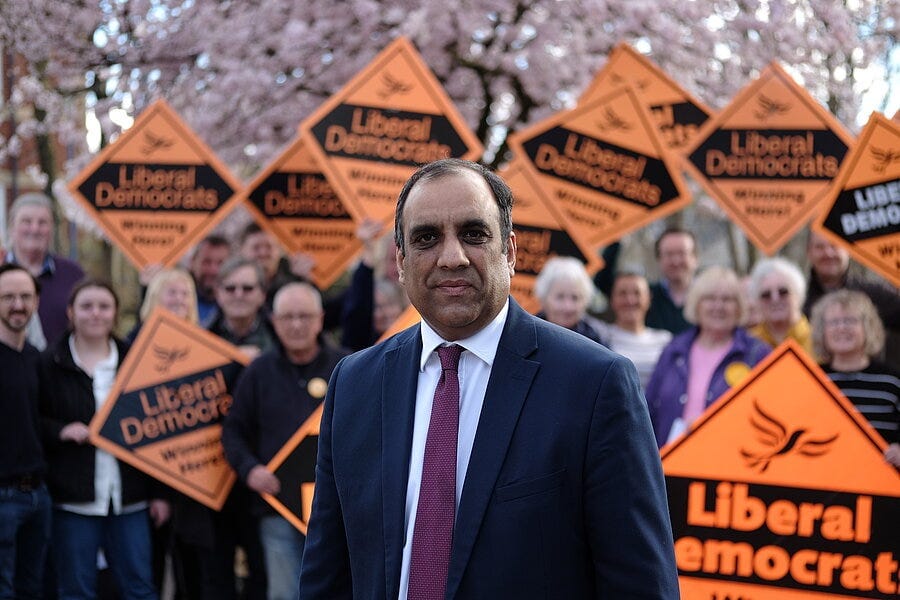
A Green party insider confirmed to The Tribune that the party was in defensive mode this year. “Absolutely, we had what I call ‘the miracle of 21’ where we targeted six wards and won all six,” they said. “Now we are defending them.” The only ward which they don’t already hold where they are targeting resources this year is Ecclesall, where candidate Peter Gilbert was around 700 votes short in 2023. But the same party insider said this was more about establishing themselves in second place rather than winning in the ward this time around.
Of the seats they are defending, Nether Edge and Sharrow and Walkley are the two where they have the hardest fight on their hands. In Nether Edge and Sharrow, which has a large Muslim population, the insider said the party’s stance on the war in Gaza is helping them. However, the party was 600 votes behind in 2023 and Labour are running a big campaign to unseat incumbent Green Maroof Raouf. “There is also the issue of the rat run on Archer Lane,” they added. “The Greens are supporting the people who live near the rat run, who are suffering through this nightmare, whereas Labour and the Lib Dems saw a bigger electoral opportunity in the votes of the people who use it.”
However, they added that the continuing fallout over Alison Teal’s candidacy and no fault suspension in Sheffield Central was still hurting the party. “It’s inevitably having an effect, yes,” they told us. “Especially in Nether Edge and Sharrow, where Alison used to be the councillor.” The other Labour/Green battleground is Walkey, where the insider admitted the Greens were “well behind”. The fact that incumbent Green councillor Bernard Little is standing down due to personal issues, and that Walkley is the ward of Labour leader Tom Hunt, means that it will be “very difficult” for the party to retain the ward, they added.
For the Lib Dems, their best case scenario would be up two seats while their worst case scenario would be down one. Crookes and Crosspool is “neck and neck” and they are also targeting Mosborough. Last time out the Lib Dems won Crookes and Crosspool by just 187 votes out of more than 6,600. The incumbent is Labour’s Ruth Milsom but both parties are going at it incredibly hard, said one senior Lib Dem member. “[Nationally] Labour are doing well in the polls but are unpopular on the council,” they told us. “Greens and Tories have got a decision to make.”
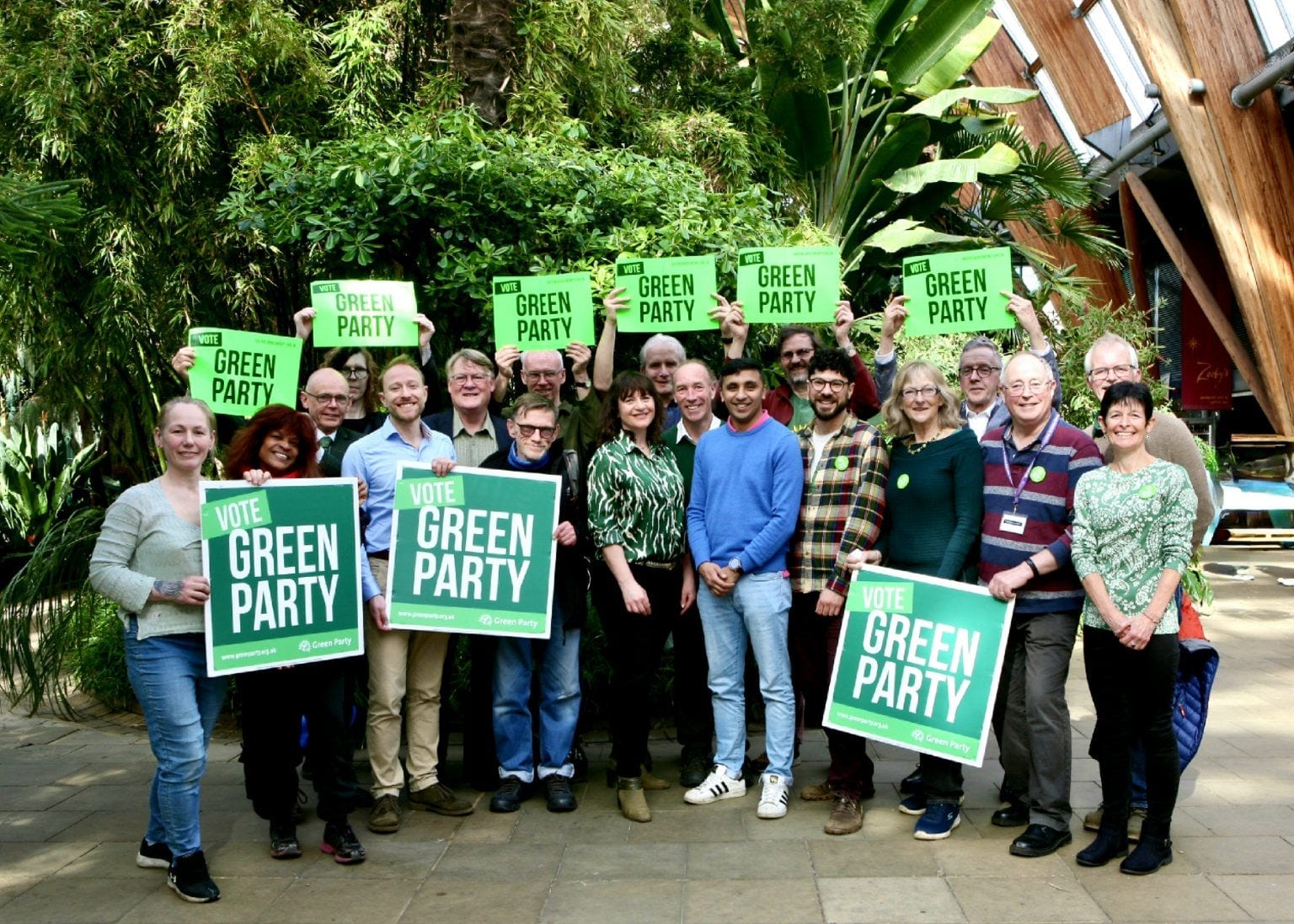
As well as Crookes and Crosspool, the Lib Dems are also targeting Mosborough, where they are hoping to unseat Labour incumbent Tony Downing after winning another seat in the same ward in 2023. The only seat they are defending this time is East Ecclesfield, which they won by just 108 votes in 2023. “That’s the one that’s closest but there’s no drama,” the insider said. “A lot of the antipathy towards us [from the coalition years] has disappeared.” Labour agree that East Ecclesfield will be close again. The reason they are targeting it this year is that it sits within the key Labour parliamentary target of Penistone and Stocksbridge, and a general election is just a matter of months away. “We would hope to win it comfortably in a general election,” said one senior Labour member. “But I don’t get a sense that anyone is panicking. They are just getting on with the plan — which is a big contrast to last year.”
Labour also have a real battle on their hands in Crookes and Crosspool. “It always is,” said one senior member of the ward that has been shared between Labour and the Lib Dems for the last 13 years. “It will depend on the day.” The close fight in Crookes and Crosspool is being seen by the Lib Dems as a dry run for the Sheffield Hallam seat at the general election, when Sheffield Lib Dem leader Shaffaq Mohammed will take on Labour’s Olivia Blake. “It will come down to what do Green and Tory voters want,” said the Lib Dem insider. “Do they want another Labour MP who will follow the whip or do they want an MP who will fight for Sheffield Hallam?” But this view is strongly disputed by Labour. “My personal view is the local elections don't have that much meaning for the general election,” one insider told us. “If Labour lose Crookes and Crosspool, it doesn’t mean that Hallam is a done deal.”
Insiders may see the two elections as disconnected — but the looming general election is shaping the local race in one key way. Labour has been on a general election footing since last year and are actively targeting wards which are in their target seats for the national poll: Sheffield Hallam and Penistone and Stocksbridge. This means that some wards have missed out on resources. Hillsborough, for example, was a Labour stronghold until recently but is getting little attention from the party this time around. The same goes for Gleadless Valley, Graves Park and Beauchief and Greenhill which are all in safe Labour seats and are therefore not seen as a priority for Labour.
The relationship between Labour and their former colleagues who left to set up the Sheffield Community Councillors grouping doesn’t seem to have improved much in the seven months since they split. “They choose to leave the Labour party and that defines their relationship with it,” one senior Labour member told us. “They see egos as more important than running the city. We could potentially be looking at a majority if they hadn’t left.”
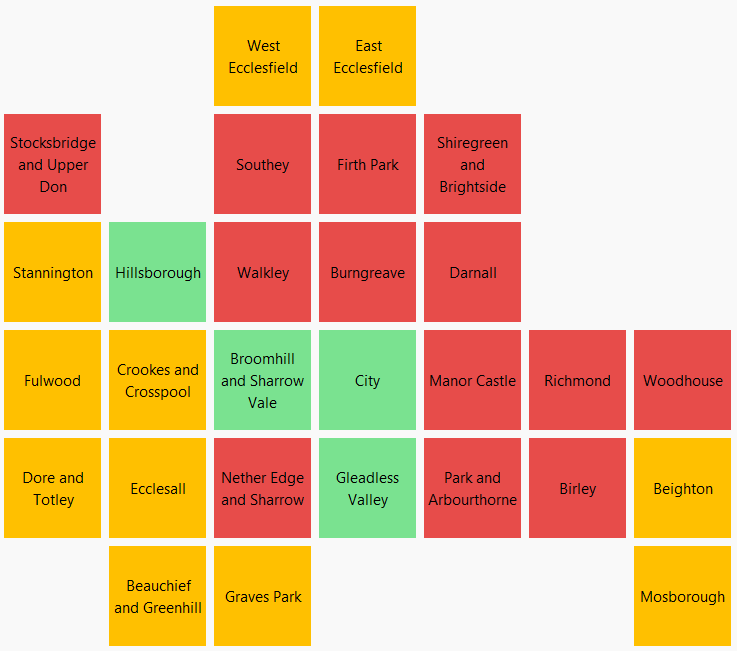
The Sheffield Community Councillors are standing in two council wards this time: Birley and Southey. Neither candidate is likely to win; when independents come up against the might of a party machine, they generally lose. But even after the election there will still be at least six in their group, enough to deprive Labour of a majority. When asked how they feel about the idea they might stop their former party winning back the council, leader Dianne Hurst doesn’t accept that they caused the problem. “I don’t think it’s our fault,” she says. “I think what most of the members of our group would say — in fact, what Tony [Damms, Southey councillor] was saying to me just this morning was that he feels that the Labour Party has left him.”
Is there any chance they could rejoin at some point; that the currently icy relationships between them and their former Labour colleagues might thaw in time? “I wouldn’t have thought so,” says Hurst. “Some of my colleagues have been members of the Labour Party for four decades and it was a very difficult decision. The party did want our votes but didn’t want to hear what we had to say. So we made the decision to leave under very difficult circumstances. I for one am content with that decision.”
One Labour insider argued that the departure of the Sheffield Community Councillors had actually been both “a blessing and a curse”, however. While the move will probably deprive Labour of a majority, it has also had the effect of making the remaining Labour group more cohesive and collegiate. “One of the reasons why the hill is so steep is because they left,” they told us. “But it’s also the reason why the team is so united and unified.” Another senior Labour source agreed. “Terry’s lot leaving means the path to a majority has to be staggered but that journey to a majority will be more comfortable, united and happy,” they told us.
The 2024 local elections should also represent a significant “changing of the guard” for the party, not just with the Sheffield Community Councillors leaving but also on the Labour side too. Several long-standing Labour councillors are standing down this time including Peter Price in Shiregreen and Brightside, Mazher Iqbal in Darnall and Sioned-Mair Richards in Manor Castle. “We've got some people coming through who are likely to be councillors who are brand new to the scene,” the senior party member told us. “It’s going to bring in a new generation to Labour politics.”
So where does all this leave us? Labour’s failure to win back control means the council will have to be run as a coalition of two or more of the parties, or else as a minority administration. But such is the bad blood between many of the party groupings, all the people we’ve spoken to say it’s difficult to see which groupings would want to work together. Either way, after all the votes are counted on Friday, expect the horse trading to begin.
Six wards to watch
Crookes and Crosspool
Incumbent: Labour
Majority: 308
Notes: One of the city’s most marginal wards, Crookes and Crosspool has been shared between Labour and the Lib Dems ever since 2011. Defending this time is Ruth Milsom, who won the ward for Labour in 2021 by just 308 votes. In 2022 Labour won again but in 2023 the Lib Dems prevailed. Whichever party wins this time will hope it’s a sign of how the Labour/Lib Dem marginal Sheffield Hallam constituency will go at the general election.
East Ecclesfield
Incumbent: Lib Dem
Majority: 20
Notes: East Ecclesfield is another ward that is currently shared between Labour and the Lib Dems, often with very tight majorities. In 2021 the Lib Dems won by just 20 votes while last year they came out on top by just 108. In between in 2022 Labour’s Craig Gamble-Pugh took the seat by just 358 votes so it’s highly likely to be on a knife edge again this year. If Labour does win the seat, it will be a sign that it has been a really good night for them.
This note was changed to make clear it was the Lib Dems won East Ecclesfield by 20 votes in 2021, not Labour.
Mosborough
Incumbent: Labour
Majority: 220
Notes: Mosborough is one of two Lib Dem targets this time around. The seat is currently held by Labour’s Tony Downing with a majority of 220. However, the Lib Dems won the ward in both 2022 (by 126 votes) and in 2023 (by 242 votes). Given the wafer thin majorities, much will depend on the parties’ ground game in getting their votes out on the day. If the Lib Dems can win here and take all three seats in the ward, it will be a good night for them.
Nether Edge and Sharrow
Incumbent: Green
Majority: 902
Notes: When Green Maroof Raouf won Nether Edge and Sharrow three years ago, it was part of the party’s “miracle of 21”. But since then Labour have been fighting back, winning in 2022 and 2023. The Greens have been damaged by the rows over Archer Lane and Alison Teal, although their stance on Gaza could win them votes in the ethnically diverse ward. Labour are hoping for a win this time which would mean they again hold all three seats in the ward.
Stocksbridge and Upper Don
Incumbent: Conservative
Majority: 497
Notes: In 2021, Stocksbridge and Upper Don became the first ward to elect a Conservative to Sheffield Council in 17 years. However, the party’s national woes will probably prevent them from keeping hold of it this time around. Incumbent Lewis Chinchen is stepping down and Labour have their eyes on a gain. If they do, they will see it as a good sign they are ready to win in the Penistone and Stocksbridge constituency at the general election.
Walkley
Incumbent: Green
Majority: 484
Notes: Walkley is another ward where Labour are hoping to make a gain from the Greens. Like Nether Edge and Sharrow, the Greens won the ward in their breakthrough year of 2021, when they took five seats from Labour, but popular incumbent Green councillor Bernard Little is having to stand down for personal reasons. Labour already has two councillors in the ward (including party leader Tom Hunt) and will be hoping this time round to make it three.
Comments
How to comment:
If you are already a member,
click here to sign in
and leave a comment.
If you aren't a member,
sign up here
to be able to leave a comment.
To add your photo, click here to create a profile on Gravatar.







